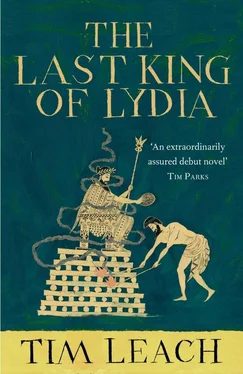Tim Leach - The Last King of Lydia
Здесь есть возможность читать онлайн «Tim Leach - The Last King of Lydia» весь текст электронной книги совершенно бесплатно (целиком полную версию без сокращений). В некоторых случаях можно слушать аудио, скачать через торрент в формате fb2 и присутствует краткое содержание. Год выпуска: 2013, ISBN: 2013, Издательство: Atlantic Books Ltd, Жанр: Исторические приключения, на английском языке. Описание произведения, (предисловие) а так же отзывы посетителей доступны на портале библиотеки ЛибКат.
- Название:The Last King of Lydia
- Автор:
- Издательство:Atlantic Books Ltd
- Жанр:
- Год:2013
- ISBN:9780857899200
- Рейтинг книги:5 / 5. Голосов: 1
-
Избранное:Добавить в избранное
- Отзывы:
-
Ваша оценка:
- 100
- 1
- 2
- 3
- 4
- 5
The Last King of Lydia: краткое содержание, описание и аннотация
Предлагаем к чтению аннотацию, описание, краткое содержание или предисловие (зависит от того, что написал сам автор книги «The Last King of Lydia»). Если вы не нашли необходимую информацию о книге — напишите в комментариях, мы постараемся отыскать её.
The Last King of Lydia — читать онлайн бесплатно полную книгу (весь текст) целиком
Ниже представлен текст книги, разбитый по страницам. Система сохранения места последней прочитанной страницы, позволяет с удобством читать онлайн бесплатно книгу «The Last King of Lydia», без необходимости каждый раз заново искать на чём Вы остановились. Поставьте закладку, и сможете в любой момент перейти на страницу, на которой закончили чтение.
Интервал:
Закладка:
He worked his way down a little further, then reached down tentatively, until his fingers hooked under metal. He placed the helmet back on his head, and breathed easy again.
He looked below him, and for a moment he hesitated, tempted to continue his climb to the bottom. It seemed a shame to go only halfway down the cliff and not to finish it. But he had been foolish enough for one day.
He looked back up at the rock he had to reclimb, but felt no fear. He knew that he would not fall. He closed his eyes and breathed out once. Then he began to climb again.
He did not climb unobserved.
The Persians watched the south wall as infrequently as the Lydians patrolled it. Why waste time staring at the impossible? But, quite by chance, Ardys was spotted by a single Persian soldier, a man called Hyroeades.
Hyroeades had been a shepherd with a love for the mountains. But he had a tendency to daydream and his flock had a tendency to wander, so he had been sent to the city by a disappointed father. When the Persians conquered that city only a few days after his arrival and forced him to join their army, he did not try to escape. He was a man who always accepted fate with indifference.
Since the siege had begun, to get away from the others, he had taken to walking the deserted parts of the besieging line. The slack discipline of the army at siege suited him well — none knew or cared if he stole away for a few hours each day.
On the fourteenth day of the siege, as he was walking alone by the south wall, he mistook the sound of the falling helmet for that of an arrowhead glancing off stone. He ducked into cover by instinct, and lay still against the ground. He watched Ardys climb.
From a distance, Hyroeades felt none of the fear that Ardys struggled against, observed none of the moments where the Lydian came close to misplacing a foot, saved at the last moment by instinct or judgement. To Hyroeades, even Ardys’s momentary slip onto one hand looked graceful, almost predestined. After Ardys had climbed back up, Hyroeades headed, almost shyly, towards the foot of the cliff. He placed a palm flat against it and looked straight up.
At first he saw nothing but a blank rockface, and he wondered whether it was a man or a god that he had seen on the wall. But then, even as he stared at it, he saw a vertical path appear out of the blank stone, that same path that Ardys had identified years before. Like Ardys, his first thought on seeing it was one of simple delight — the impossible made possible, a blank wall of stone transforming into a causeway to the city. A shy smile played on his lips. Then he thought about the consequences of his discovery, and the smile faded.
Perhaps he would say nothing. Unlike many, he was enjoying the siege; the long, slow days without responsibility, where nothing was expected of him but waiting. He would have been happy, he thought, to wait a hundred years beneath those walls.
But he was a man who was obedient to authority, who feared the consequences of disobedience above all else. Suddenly fearful, he looked around to see if anyone was watching him, and might attest to his hesitation. He saw no one, but the fear remained.
He turned and began the long walk back towards the encampment, to go and tell his captain what he had seen.
12
Rough hands shook the king awake.
‘Master?’
‘What is it?’
‘They are in the city.’
‘What?’
‘The Persians are over the wall.’
Croesus said nothing for a time. He stared at Isocrates, uncomprehending. ‘How?’ he said at last.
‘They climbed the south wall.’
The king shook his head. ‘That’s-’
‘They found a way up. I don’t know how.’
Croesus seemed not to hear for a moment, one hand plucking absently at his blankets. Then he let out a single sharp sob, and pressed his fingers to his eyes. Isocrates looked away.
‘Is there any hope?’ the king said.
‘No, master.’
Croesus took his fingers from his eyes, and nodded slowly. ‘Where is Sandanis?’
‘He is dead.’
‘What?’
‘He took poison. When he heard the news.’
Croesus nodded dully. ‘He should have fallen on his sword. It would have been more fitting.’
‘Master, I need to go and find my wife.’
Croesus looked up at him. ‘How dare-’ he began. Then he hesitated, seeing the expression on the slave’s face. He doesn’t need to obey me any more, Croesus thought. He is doing this as a last courtesy.
‘Of course,’ the king said. Isocrates turned to go, but Croesus spoke again. ‘Is there. . Is there anything you think I should do, Isocrates?’ the king said.
‘No.’ The slave shook his head. ‘There is nothing left to do.’
Sardis burned.
For the Persians, the city was a monster to be slain — every temple, house and statue an appendage to be cut away and burned, every man and woman of the city a drop of blood to be bled.
The people of Sardis knew that there was no hope for them. Some knelt and prayed openly in the streets, others gathered and barricaded themselves into temples that would soon become charnel houses. Others tried to buy their way out, offering gold and slaves, their daughters and wives, in a bid to escape the slaughter. Many rushed to hurl themselves from the high cliffs rather than die at the hands of the Persians.
The Lydian soldiers, for the most part, threw down their weapons and moved amongst the people. Some tried to maintain a sense of martial order, and here and there a group of soldiers would assemble together and make a futile stand at a corner of a street where they had once played as children, or at a statue that one of them had worshipped every day of his life — anywhere they could find that was of significance to them. One wild-looking soldier died after challenging a series of Persians to single combat on the steps of his favourite brothel, as though he were defending a temple or the house of a king.
The people of Sardis knew that they would not survive the night. They each tried to find the right place, the right way, to die.
It was quiet in the throne room.
The marble room was located near the heart of the palace, and the Persians had yet to enter the grounds. Occasionally, he heard the solitary, panicked footsteps of someone running in a corridor nearby, feet beating louder and louder against the stone floor, then fading back to silence. He tensed each time he heard someone approach, praying that they would not enter, hoping that they would. So long as he was alone, he felt safe. So long as he was alone, he felt himself edging one step closer to madness. He wondered how long it would take them to find him.
He thought about how he used to play at being a king. Back then he had been forced to make do with a dusty room, a shattered chest for a throne, a host of imaginary courtiers for company. Now, he saw that without others to serve him, he was no longer a king. He was a man sitting alone in an empty room, waiting to die. He couldn’t even bring himself to occupy the throne itself, and he squatted at its foot like a dog or a slave, his back resting against it.
After a time, he heard something different. A pair of familiar slow, scraping footsteps approaching the throne room, inch by inch. At first they were so faint, and paused so often, that he was certain he imagined them. Soon there was no doubting that the footsteps were real, no question whom they belonged to. Croesus sat still at the foot of his throne and waited for his son.
It had been many months since his son had permitted anyone to bathe him. He had a long beard and dirt-matted hair, and even from a distance the air was thick with the stink of him. He looked like a wild man, a mad prophet. He looked like anything but a prince.
Читать дальшеИнтервал:
Закладка:
Похожие книги на «The Last King of Lydia»
Представляем Вашему вниманию похожие книги на «The Last King of Lydia» списком для выбора. Мы отобрали схожую по названию и смыслу литературу в надежде предоставить читателям больше вариантов отыскать новые, интересные, ещё непрочитанные произведения.
Обсуждение, отзывы о книге «The Last King of Lydia» и просто собственные мнения читателей. Оставьте ваши комментарии, напишите, что Вы думаете о произведении, его смысле или главных героях. Укажите что конкретно понравилось, а что нет, и почему Вы так считаете.












